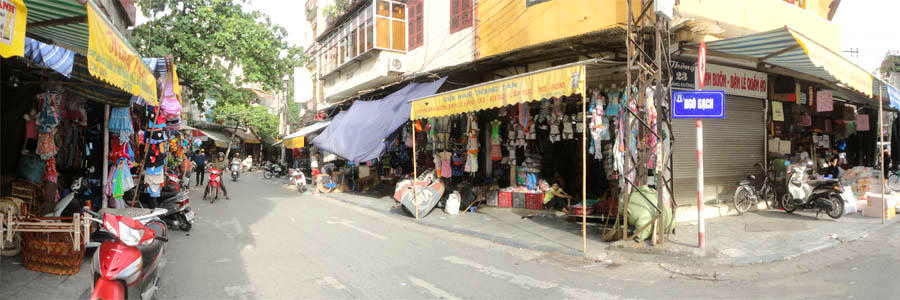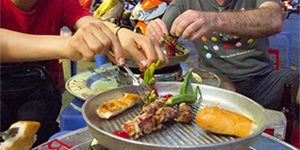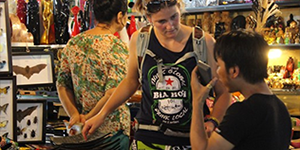Hanoi Streets

Ngo Gach Street once upon a time was a part of the river flowing through the heart of the Royal Citadel. Later, urban planners covered up the water trench to make a road which is now Ngo Gach. The name derives from the trade of the road. Ngo Gach literally means the Brick Alley as its trade was to exchange bricks and building materials given its proximity to the river. The location made transportation easier and affordable. Thus, merchants in the material business all gathered to this small street.
From Hang Ngang and Hang Duong Street turning to Ngo Gach Street is a short curve. At the curve is an ancient temple in the shade of an overgrown banyan. The Temple Gate is not remarkable. However, the inside is quite large in the urban standard. The establishments are Thanh Ha communal temple and Dong Mon Pagoda. The honored figures here is an interesting combination of Buddha and Taoism fairies.
The whole street is over 100m long, there are, however, no more than separate five houses; house numbers include the main houses and the back numbers of different houses on the parallel street. The houses in the street are out of date as they were all built for quite a while with little renovation. They are in the old style with tiny usage space in two stories. The few exceptions are taller houses which were built in 1948 period.
The stores here usually have sliding doors with its merchandises on display at the front: cement packages, color powder, fiber brooms and tile samples. The end connecting to Hang Ngang- Hang Duong Street is a long wall. Meanwhile, the middle of the street is occupied by the mentioned pagoda and communal temple. The end connecting to Hang GiayStreet is once a storage of the famous business house of Van Bao. Now, it is the Food Department of Hanoi City. On the opposite is the back gate of Kim Mon Theatre with a dozen-meter wall.
The 20 Ngo Gach Street was the back door to the giant house of which front door is on Hang ChieuStreet. This was once the store of Anh Ho by Mr. Ngo Le Dong. Here in this house, in 1947 Tet, the capital revolution force celebrated the New Year Eve at the midst of the war to the surprise of diplomatic missions in Hanoi. Ngo GachStreet once hosted a legal brothel during French colony which was licensed and put in the tax record.




